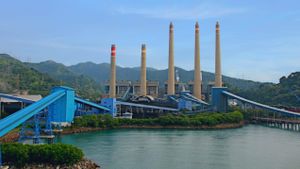YOGYAKARTA What is ESG? ESG is an acronym for Environmental, Social and Governance. ESG is very important for companies and investments, because it is in line with the implementation of a circular economy designed by the government.
As stated by the Minister of Industry (Menperind) Agus Gumiwang Kartasasmita during the inauguration of the Food Grade PET (Polyethylene Terephthalate) Recycle Factory PT on February 9, 2023.
It should be noted that Bumi Indis Padma Jaya (BIPJ) is in Jombang, East Java. PT BIPJ is a joint venture company which is also supported by industrial company Mayora Group.
"Currently, issues related to ESG (environmental, social, and governance) and the green industry have become an important concern. In fact, if you look at the Leaders Declaration of the G20 Summit ago, there is an emphasis on strengthening the implementation of ESG and the green industry," said Agus, referring to VOI.
ESG is one of the parameters for the implementation of SDGs development (Sustainable Development Goals), quoted from the OJK Attitude page, Monday, March 13, 2023.
The ESG concept prioritizes sustainable development or investment activities with three main factors, namely the social environment and governance.
Thus, all forms of activity and decision-making of financial services companies should be able to fully implement the principles of environmental conservation, social responsibility, and good governance.
While damped from Investopedia, ESG is a set of standards that investors use to filter investments based on company policies and encourage companies to act responsibly.
Companies that apply the ESH principle in business practice and their investment will integrate and implement company policies, so that they are in line with the sustainability of the environment, social, and corporate governance (ESG).
ESG Criteria
ESG refers to three criteria closely related to the sustainability of the company and is a central factor for measuring the impact of continuity and ethics in decision making in investing in certain businesses and companies. The three criteria are Environmental, Social, and Governance.
More complete explanations of the three criteria can be seen in the following reviews:
1. Environment (environment)
The curvature factor in the ESG discusses how the company considers the impact of business operations on the environment and the role of the company as an environmental guard. The elements include:
2. Social (social)
Social factors from ESG discuss how companies consider the company's relationship and reputation towards its stakeholders and how companies foster stakeholders, suppliers, consumers, communities, communities, and related parties of the company.
Social elements from ESG include:
3. Governance (management)
Meanwhile, governance factors show how a company has a good and integrated management process in its internal parts.
Governance criteria are related to company leadership, executive salaries, audits, internal controls, and shareholder rights. The elements of governance in ESG include:
The Importance Of ESG In Sustainable Investment
ESG has a very important role in the business world. Companies that prioritize ESG, will produce quality products.
In addition to having an economic impact, the company also has a positive impact on social and environmental.
Companies implementing ESG are also considered relatively more resilient or have high resilience during times of crisis, and can create value and profits in the long term. If a company is able to implement ESG, then investor confidence in the company increases.
That is information about what ESG is and the criteria and importance of ESG in business. Hopefully this article can add insight to the loyal readers of VOI.ID.
The English, Chinese, Japanese, Arabic, and French versions are automatically generated by the AI. So there may still be inaccuracies in translating, please always see Indonesian as our main language. (system supported by DigitalSiber.id)












